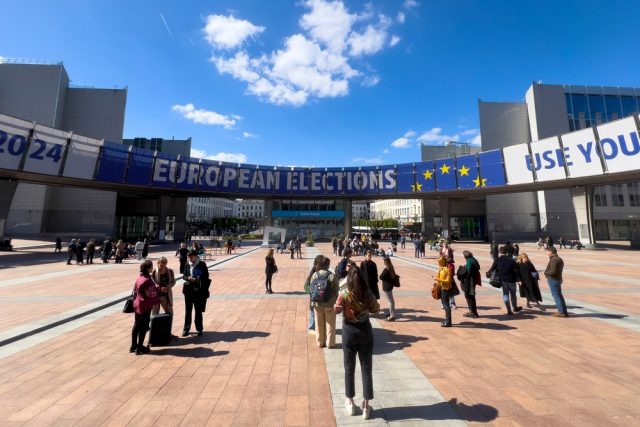
The 3rd of June has marked the end of the legal deadline for the publication of polls on the possible outcome of the European elections. In this line, the latest Sociological Research Centre (CIS) poll has suggested that the Socialist Party (PSOE) will be the leading party in the 9 June elections, with an estimated support between 31.6 and 33.2 per cent, beating the People’s Party by nearly three percentage points.
The results of the polls, while diverging in some respects, offer an interesting insight into the preferences and trends of the Spanish electorate. While the CIS poll gives a slight advantage to the PSOE, other private polls, such as the one conducted by GAD3, show a possible victory for the People’s Party, predicting a significant increase in its parliamentary representation, with 34.9% of the vote.
The European elections always represent a crucial moment to assess the political landscape, both at the continental and national level. On this occasion, against the backdrop of a changing and challenging world, the 9th of June elections take on an unprecedented relevance for the future of the European Union.
In the Spanish context, these elections transcend their purely European scope. Beyond selecting representatives to the European Parliament, these votes serve as a thermometer to measure the pulse of domestic politics, especially at a time when the government led by Sánchez and his allies exhibits cracks and challenges.
However, it is the emergence of Vox that captures the attention of many political observers, with an electoral programme focused on returning voice and decision-making power to Spaniards within the European Union. Vox presents itself as a clear option for those seeking a firm stance in defence of national sovereignty and cultural identity. Its proposals include the repeal of the European Green Pact and the 2030 Agenda, pointing to the need to protect key sectors of the Spanish economy, such as industry and employment. In addition, Vox advocates for more secure borders to combat illegal immigration, a common agricultural policy without ideological impositions, and more active leadership in promoting freedom in Latin America. These proposals reflect its commitment to a Europe of sovereign nations that cooperate freely and to the promotion of policies that directly benefit Spanish and European citizens.
After the good result obtained in the Catalan regional elections, the rise of VOX for this european elections, which is projected as the third force in the polls, is evidence of a paradigm shift in the Spanish political spectrum. With an estimated 11% of the vote according to the CIS and 9.7% according to GAD3, Vox is gaining ground and consolidating its position as a relevant actor in the Spanish political landscape.
This phenomenon is also reflected in the decline of other political forces. Podemos, for example, faces a significant decline in electoral support, according to CIS forecasts, which place it at between 3.6 and 3.9 per cent of the vote. This result, combined with the forecast of a slump for Ciudadanos to 1.2 per cent, suggests a shift in the balance of power within the Spanish political spectrum.
Moreover, it is worth noting the emergence of new political forces on both sides of the politicala arena, from Se acabó la fiesta to Izquierda Española, arising from the discontent and the search for alternatives of a part of the Spanish electorate. Their results, still uncertain, could alter the distribution of seats among the four main Spanish parties.
All in all, the European elections on 9 June will not only determine the composition of the European Parliament but will also offer a revealing insight into the political reality and preferences of the Spanish electorate at a crucial moment in the history of the European Union and Spain.



 Subscribe
Subscribe